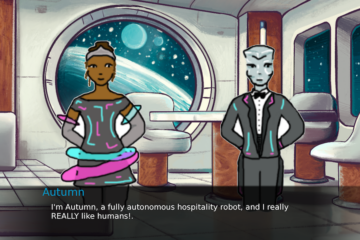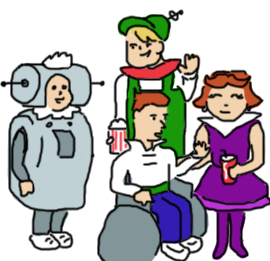This originally appeared on John Scalzi’s Big Idea Blog on March 9th, the launch day for Galactic Hellcats.
My dad’s buddies were bikers. Guys whose legal names I still don’t know, but called Froggy or Uncle Um. Their wives and girlfriends with thick mascara and wind-burned faces had motorcycles, too. I begged all of them until I got to take a ride around the block once with Froggy, and then pleaded the whole time for the speed limit to be broken. (It wasn’t.)
It was very clear that these men and women derived some part of their identity, their self-worth, from being motorcyclists. They wore motorcycle-themed clothes and bought each other accessories. One had a motorcycle-themed pinball machine in his garage. The message was clear: it was better to be a biker.
No, my dad didn’t have a motorcycle, though he’d been invited to join the Hell’s Angels. Turned out, hogs are crazily expensive, and not very practical when you’re a single father with three girls.
When I rode my bicycle under the sodium lights at the end of a long summer day, I didn’t imagine a Harley, though. If you’re imagining, you go big. I pictured my banana-seat transformed into a sleek bullet of glass and steel, a spaceship that could skim the pavement or shoot out across the sky. She could transform, of course, into a battle robot, and her name was Celeste and she was my sarcastic best friend.
Why was this idea of going fast, alone, so important? What does it represent? All young nerds learn to loathe the word “escapism,” so often used to dismiss our favorite things, but escape is a deep human need. Escaping harm. Escaping fear. Being free from math homework and washing the dishes. Being able to hope that you might achieve escape velocity from your crummy neighborhood and the quiet desperation of adult life.
If you can’t afford a motorcycle, you draw one. Art was always a big part of our family. We were George H. W. Bush’s “cultural elite,” watching PBS and checking out heavy stacks of books from the library while we dined on government cheese and powdered milk.
My dad said, “Work is how you live, art is why.”
When we were 12, my twin sister doodled a trio of punk girls and a motorcycle on one of the inside divider pages of a spiral notebook we shared for school. I immediately started writing their story, how one was a thief and another a soldier and the third a computer expert and how they had space motorcycles and stole things and fought cops… er… bad guys. Okay, mostly cops.
I filled a notebook with the first version of “Galactic Hellcats” and used up all the ink in my sister’s purple pen. (She’s still mad.)
Then, the complete adventures sat there, forgotten in a drawer, along with all the other “novels” I wrote in junior high.
Why did I go back to that well, that ignoble, thieving pen? I dunno. I’ve been writing unpublished novels since I was 10. I sent three novels out on submission when I was 18. Then college happened, and working to support myself, and those dreams had to stay on hold.
When I most needed escapism in my life, there was no time for it. I didn’t escape minimum wage. I didn’t escape panicked math at the end of the month to keep my checking account alive.
I never stopped writing, though, or submitting my work to be rejected. Around the tender age of 39, ever the prodigy, I started selling short stories regularly, but I just couldn’t get anyone interested in a novel. I wrote and wrote. I tried to write something that hadn’t “been done” and also that toed the line of what I knew was acceptable in the genre after years of reading flippant tweets about explosions in space. I wanted to write science fiction, but I feared backlash so much that most of my novel projects were fantasy or literary.
Why didn’t I write what interested me most? I heard these voices, this chorus of judgement saying everything in the novels I devoured as a child was WRONG, that you couldn’t have FTL travel that was instantaneous, you couldn’t have ansibles, you couldn’t have a galactic civilization or people wouldn’t be doing the travelling themselves– you couldn’t have any of the cool stuff.
Science fiction fandom is full of loud voices, would-be gatekeepers eager to shoot you down if you don’t meet all their expectations. Infuriatingly, I just knew these guys read the same books I did as teens and didn’t mind their relativity-ignoring plots back then. But you know what I forgot about those guys? They aren’t actual gate keepers. Editors, assistant editors, publishers – those are the actual holders of the keys to the kingdom.
I’ve sold ten stories to Analog now and made regular appearances on their reader’s choice finalist lists. Maybe it won’t tarnish my hard-sf geek reputation forever if I break a rule or three.
I decided to go back, to remember what was important to me when I didn’t know the rules. When I didn’t stop and ask myself if my idea was valid or if it had been done or all the other killing thoughts we writers have. What did I want, when I was twelve? I wanted a space motorcycle, and I didn’t care what anyone thought about that. Space motorcycles are cool.
People have been telling me I can’t have what I want since I was a starving kid getting shooed out of the corner store. Since I was told I wasn’t a real fan if I hadn’t read every book some other guy had. That’s what a motorcycle symbolizes, and a space motorcycle more so: the freedom to escape. To ride something stripped down and a little bit dangerous. To define yourself on your own terms.
Keep your rules, squares.


